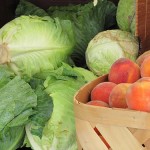Lawmakers Propose Farm-To-Table Program To Promote Local Agriculture
New Hampshire lawmakers have introduced legislation that aims to expand the market for food grown in the Granite State.
Senate Bill 141 would establish a farm-to-table program to help bolster the state’s “food and farm economy” by increasing access to healthy food, promoting jobs and encouraging private and public investment in local agriculture.
A public hearing is scheduled for 10:15 Wednesday in Room 100 of the Statehouse.
The bill, sponsored by a half dozen legislators led by Sen. Martha Fuller Clark (D-Portsmouth), calls for creation of an advisory council to the New Hampshire Department of Agriculture, Markets and Food. Among its duties, the council would be charged with gathering data on the types of food produced in New Hampshire, “current and potential markets” for local farmers and the extent of land available for future food production.
The bill calls for a strategic plan, due in late 2014, “to identify methods and the funding necessary to strengthen the links among producers, processors and markets.” The plan would aim to expand the existing farm-to-school program in New Hampshire, encourage the purchase of local foods by businesses and help farmers market their products to consumers.
The bill does not allocate funding, but authorizes the advisory council to apply for grants to help farmers’ markets and community-supported agriculture.
According to the state’s most recent data, gathered in 2005 by the Institute for New Hampshire Studies at Plymouth State University, agriculture is a $935 million industry in New Hampshire, including $554 million in direct sales of food and horticultural products and services. There are about 3,400 commercial farming operations in the Granite State, according to the data, encompassing about 450,000 acres dedicated to a range of agricultural uses, from conventional crops to Christmas trees.
The growing interest in locally produced food has opened new markets for New Hampshire farmers, says Charlie Burke, president of the New Hampshire Farm to Restaurant Connection, but more can be done. He says that while New Hampshire has a right-to-farm statute, resistance some local ordinances have made it more difficult for farmers to maximize production.
And, Burke says, since New Hampshire ended its livestock inspection program in 1977, farmers have been forced to take their animals out of state for processing. That has increased costs and restricted the availability of locally grown beef, pork and poultry.
“I think if we had easily accessible meat processing you would see larger herds of animals all over the state,” Burke says. “Dairy farms could be raising beef as well.”
Burke, whose organization promotes New Hampshire farm products to local chefs and the public, says he’s encouraged by SB 141. He sees it as an opportunity to focus local-food activists from around the state on a common goal — supporting New Hampshire farms and farmers.
“I’m glad to see anything that beefs up the local ag economy,” he says. “By protecting New Hampshire farms and sustaining them, we’re preserving the rural heritage of New Hampshire and what makes New Hampshire, New Hampshire — instead of northern Massachusetts.”
